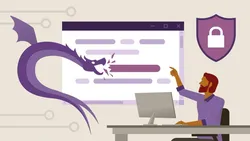
Kali Linux Fundamentals Training Course 
This Kali Linux Fundamentals Training Course is a 5-part series that covers the basics of Kali Linux. It includes an introduction to the operating system, how to install and configure it, and how to use it for security testing. It also covers topics such as network scanning, vulnerability assessment, and penetration testing. This course is perfect for anyone looking to learn the basics of Kali Linux. ▼
ADVERTISEMENT
Course Feature
![]() Cost:
Cost:
Free
![]() Provider:
Provider:
Cybrary
![]() Certificate:
Certificate:
Paid Certification
![]() Language:
Language:
English
![]() Start Date:
Start Date:
On-Demand
Course Overview
❗The content presented here is sourced directly from Cybrary platform. For comprehensive course details, including enrollment information, simply click on the 'Go to class' link on our website.
Updated in [May 25th, 2023]
This Kali Linux Fundamentals Training Course provides an introduction to the Kali Linux operating system. It is divided into five lessons, each of which covers a different aspect of the system. The first lesson provides an overview of the system, including its features and capabilities. The second lesson covers the installation and configuration of the system. The third lesson covers the use of the command line interface and the fourth lesson covers the use of the graphical user interface. The fifth lesson covers the use of the Kali Linux tools and applications. Each lesson includes hands-on exercises to help the student gain a better understanding of the system.
[Applications]
The application of this Kali Linux Fundamentals Training Course can be seen in many areas. It can be used to help individuals learn the basics of the Linux operating system, as well as how to use the various tools and techniques available in Kali Linux. It can also be used to help individuals understand the security implications of using Kali Linux, and how to protect their systems from malicious actors. Additionally, the course can be used to help individuals understand the basics of network security, and how to use Kali Linux to protect their networks. Finally, the course can also be used to help individuals understand the basics of digital forensics, and how to use Kali Linux to investigate digital crimes.
[Career Paths]
1. Cyber Security Analyst: Cyber Security Analysts are responsible for monitoring and protecting computer networks and systems from malicious attacks. They use a variety of tools and techniques to identify potential threats and vulnerabilities, and then develop strategies to mitigate them. Cyber Security Analysts must stay up-to-date on the latest trends in cyber security and be able to quickly respond to any threats.
2. Penetration Tester: Penetration Testers are responsible for testing the security of computer networks and systems. They use a variety of tools and techniques to identify potential vulnerabilities and then develop strategies to mitigate them. Penetration Testers must stay up-to-date on the latest trends in cyber security and be able to quickly respond to any threats.
3. Network Security Engineer: Network Security Engineers are responsible for designing, implementing, and maintaining secure networks. They use a variety of tools and techniques to identify potential threats and vulnerabilities, and then develop strategies to mitigate them. Network Security Engineers must stay up-to-date on the latest trends in cyber security and be able to quickly respond to any threats.
4. Cyber Security Consultant: Cyber Security Consultants are responsible for providing advice and guidance to organizations on how to protect their networks and systems from malicious attacks. They use a variety of tools and techniques to identify potential threats and vulnerabilities, and then develop strategies to mitigate them. Cyber Security Consultants must stay up-to-date on the latest trends in cyber security and be able to quickly respond to any threats.
[Education Paths]
1. Bachelor's Degree in Cybersecurity: A Bachelor's Degree in Cybersecurity is a great way to gain the knowledge and skills needed to protect networks and systems from malicious attacks. This degree program typically covers topics such as network security, cryptography, computer forensics, and ethical hacking. With the increasing demand for cybersecurity professionals, this degree path is becoming increasingly popular.
2. Master's Degree in Information Security: A Master's Degree in Information Security is a great way to gain the advanced knowledge and skills needed to protect networks and systems from malicious attacks. This degree program typically covers topics such as network security, cryptography, computer forensics, and ethical hacking. With the increasing demand for cybersecurity professionals, this degree path is becoming increasingly popular.
3. Doctorate Degree in Cybersecurity: A Doctorate Degree in Cybersecurity is a great way to gain the highest level of knowledge and skills needed to protect networks and systems from malicious attacks. This degree program typically covers topics such as network security, cryptography, computer forensics, and ethical hacking. With the increasing demand for cybersecurity professionals, this degree path is becoming increasingly popular.
4. Certificate in Cybersecurity: A Certificate in Cybersecurity is a great way to gain the basic knowledge and skills needed to protect networks and systems from malicious attacks. This certificate program typically covers topics such as network security, cryptography, computer forensics, and ethical hacking. With the increasing demand for cybersecurity professionals, this degree path is becoming increasingly popular.
Course Provider

Provider Cybrary's Stats at AZClass
Discussion and Reviews
0.0 (Based on 0 reviews)
Explore Similar Online Courses

Japanese Language Lessons

Learning PLC Ladder Logic

Python for Informatics: Exploring Information

Social Network Analysis

Introduction to Systematic Review and Meta-Analysis

The Analytics Edge

DCO042 - Python For Informatics

Causal Diagrams: Draw Your Assumptions Before Your Conclusions

Whole genome sequencing of bacterial genomes - tools and applications

Learning Kali Linux

Learning Kali Linux on Windows


Start your review of Kali Linux Fundamentals Training Course